情态动词can和could之基本用法
情态动词can与could用法归纳
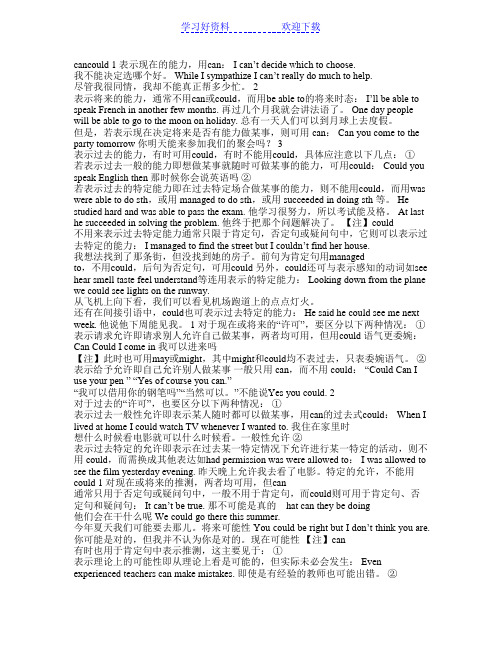
cancould 1 表示现在的能力,用can: I can’t decide which to choose.我不能决定选哪个好。
While I sympathize I can’t really do much to help.尽管我很同情,我却不能真正帮多少忙。
2表示将来的能力,通常不用can或could,而用be able to的将来时态: I’ll be able to speak French in another few months. 再过几个月我就会讲法语了。
One day people will be able to go to the moon on holiday. 总有一天人们可以到月球上去度假。
但是,若表示现在决定将来是否有能力做某事,则可用 can: Can you come to the party tomorrow 你明天能来参加我们的聚会吗? 3表示过去的能力,有时可用could,有时不能用could,具体应注意以下几点:①若表示过去一般的能力即想做某事就随时可做某事的能力,可用could: Could you speak English then 那时候你会说英语吗②若表示过去的特定能力即在过去特定场合做某事的能力,则不能用could,而用was were able to do sth,或用 managed to do sth,或用 succeeded in doing sth 等。
He studied hard and was able to pass the exam. 他学习很努力,所以考试能及格。
At last he succeeded in solving the problem. 他终于把那个问题解决了。
【注】could不用来表示过去特定能力通常只限于肯定句,否定句或疑问句中,它则可以表示过去特定的能力: I managed to find the street but I couldn’t find her house.我想法找到了那条街,但没找到她的房子。
英语中情态动词can和could的用法及例句
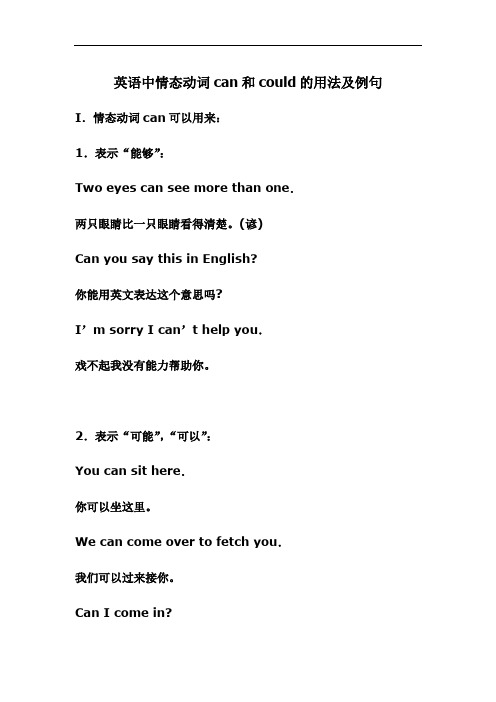
英语中情态动词can和could的用法及例句I.情态动词can可以用来:1.表示“能够”:Two eyes can see more than one.两只眼睛比一只眼睛看得清楚。
(谚)Can you say this in English?你能用英文表达这个意思吗?I’m sorry I can’t help you.戏不起我没有能力帮助你。
2.表示“可能”,“可以”:You can sit here.你可以坐这里。
We can come over to fetch you.我们可以过来接你。
Can I come in?我可以进来吗?3.(用在疑问及否定句中)表示惊异不可能等(后面有时可跟完成及进行形式):She can’t be serious.她不可能是当真的。
How call you be so silly?你怎么这样傻?Where can he have gone?他能到哪里去了呢?What can she be doing now?她现在能在干什么呢?II.情态动词could可以用来表示:1)能够:Nobody conld answer that question.没人能回答那个问题。
It was so dark,we couldn’t see anything.天那样黑我们什么也看不见。
2)可能,可以:He said he couldn’t come.他说他不能来。
I said we could go by boat.我说我们可以坐船去。
2.可以用来代替can,比较委婉地提出请求用法等(a)或是表示惊异不相信等(b):a.Could you do me a favor?你能帮我一个忙吗?We could send the parcel by air mail.这包裹可以航空寄去。
b.How could he be so rude?他怎么这样粗鲁无礼?They couldn’t have left so soon.他们不可能走得这么早。
情态动词can和could的用法
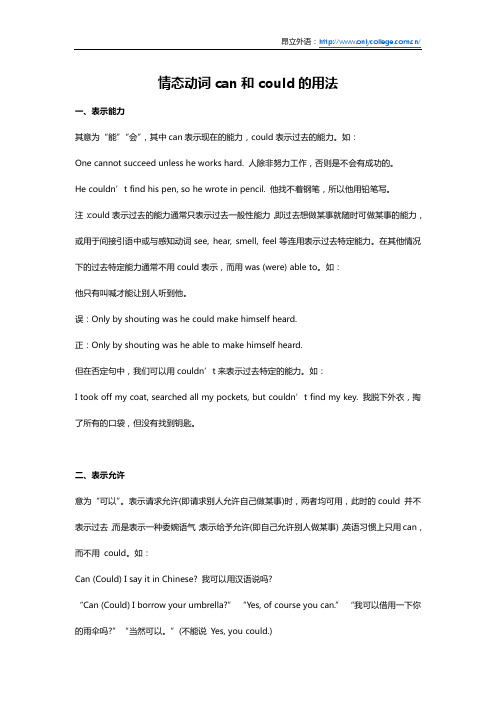
情态动词can和could的用法一、表示能力其意为“能”“会”,其中can表示现在的能力,could表示过去的能力。
如:One cannot succeed unless he works hard. 人除非努力工作,否则是不会有成功的。
He couldn’t find his pen, so he wrote in pencil. 他找不着钢笔,所以他用铅笔写。
注:could表示过去的能力通常只表示过去一般性能力,即过去想做某事就随时可做某事的能力,或用于间接引语中或与感知动词see, hear, smell, feel等连用表示过去特定能力。
在其他情况下的过去特定能力通常不用could表示,而用was (were) able to。
如:他只有叫喊才能让别人听到他。
误:Only by shouting was he could make himself heard.正:Only by shouting was he able to make himself heard.但在否定句中,我们可以用couldn’t来表示过去特定的能力。
如:I took off my coat, searched all my pockets, but couldn’t find my key. 我脱下外衣,掏了所有的口袋,但没有找到钥匙。
二、表示允许意为“可以”。
表示请求允许(即请求别人允许自己做某事)时,两者均可用,此时的could 并不表示过去,而是表示一种委婉语气;表示给予允许(即自己允许别人做某事),英语习惯上只用can,而不用could。
如:Can (Could) I say it in Chinese? 我可以用汉语说吗?“Can (Could) I borrow your umbrella?” “Yes, of course you can.” “我可以借用一下你的雨伞吗?”“当然可以。
”(不能说Yes, you could.)注:以上说的是针对现在或将来情况而言的,若谈的是过去情况,则过去could只用于表示过去一般性允许(即表示某人随时都可以做某事),而不表示特定的允许(即表示在过去某一特定情况下允许进行某一特定的活动),遇此情况需换成其他表达。
八年级上册英语语法《情态动词can与could的用法》知识点
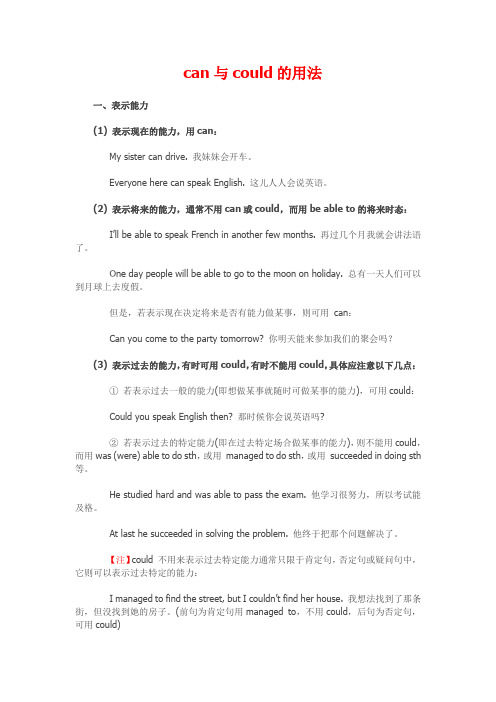
can与could的用法一、表示能力(1) 表示现在的能力,用can:My sister can drive. 我妹妹会开车。
Everyone here can speak English. 这儿人人会说英语。
(2) 表示将来的能力,通常不用can或could,而用be able to的将来时态:I’ll be able to speak French in another few months. 再过几个月我就会讲法语了。
One day people will be able to go to the moon on holiday. 总有一天人们可以到月球上去度假。
但是,若表示现在决定将来是否有能力做某事,则可用can:Can you come to the party tomorrow? 你明天能来参加我们的聚会吗?(3) 表示过去的能力,有时可用could,有时不能用could,具体应注意以下几点:①若表示过去一般的能力(即想做某事就随时可做某事的能力),可用could:Could you speak English then? 那时候你会说英语吗?②若表示过去的特定能力(即在过去特定场合做某事的能力),则不能用could,而用was (were) able to do sth,或用managed to do sth,或用succeeded in doing sth 等。
He studied hard and was able to pass the exam. 他学习很努力,所以考试能及格。
At last he succeeded in solving the problem. 他终于把那个问题解决了。
【注】could 不用来表示过去特定能力通常只限于肯定句,否定句或疑问句中,它则可以表示过去特定的能力:I managed to find the s treet, but I couldn’t find her house. 我想法找到了那条街,但没找到她的房子。
can和could的用法

can和could的用法1. 表示能力或客观可能性,还可以表示请求和允许.如:Can you finish this work tonight?Man cannot live without air.—Can I go now? —Yes, you can.注意:①could也可表示请求,语气委婉,主要用于疑问句,不可用于肯定句,答语应用can (即could不能用于现在时态的简略答语中).如:Could I come to see you tomorrow?Yes, you can. (否定答语可用No, I'm afraid not.)②can表示能力时,还可用be able to代替.如:I'll not be able to come this afternoon.2. 表示惊异、怀疑、不相信的态度.(主要用在否定句、疑问句或惊叹句中)Can this be true?How can you be so careless!This cannot be done by him.3. “can(could) + have + 过去分词”的疑问或否定形式表示对过去发生的行为怀疑或不肯定.如:He cannot have been to that town.Can he have got the book?4. 用在疑问句及否定句中,表示惊讶,不相信等.5. cannot```too\enough表示"无论怎样``````也不过分","越``````越好"can (could) 表示说话人能,可以,同意,准许,以及客观条件许可,could 为can 的过去式.Can you pass me the books?你能给我递一下书吗?Could you help me, please?请问,你能帮助我吗?What can you do?你能干点什么呢?Can you be sure?你有把握吗?can 和could 只能用于现在式和过去式两种时态,将来时态用be able to 来表示.He could help us at all.他完全可以帮助我们.Can you tell me 和Could you tell me的区别是什么?两者的意思一样都是你能不能告诉我...的意思但是后者的语气更加委婉含有一种征求对方同意的感觉可以,但是could you 是比较有恳求的意思,而can you 是比较有命令口气的,意思相同Would youWould是will的过去式,但它也是一个情态动词。
情态动词can与could用法归纳

情态动词c an与c ould用法归纳1. 表示能力can 与could 表示能力时,请注意以下用法:(1) 表示现在的能力,用c an:My sister can drive. 我妹妹会开车。
Everyone here can speak English. 这儿人人会说英语。
(2) 表示将来的能力,通常不用c an或c ould,而用b e able to的将来时态:I’ll be able to speak French in another few months. 再过几个月我就会讲法语了。
One day people will be able to go to the moon on holiday. 总有一天人们可以到月球上去度假。
但是,若表示现在决定将来是否有能力做某事,则可用can:Can you come to the party tomorrow? 你明天能来参加我们的聚会吗?(3) 表示过去的能力,有时可用c ould,有时不能用c ould,具体应注意以下几点:①若表示过去一般的能力(即想做某事就随时可做某事的能力),可用c ould:Could you speak English then? 那时候你会说英语吗?②若表示过去的特定能力(即在过去特定场合做某事的能力),则不能用c ould,而用w as (were) able to do sth,或用managed to do sth,或用succeeded in doing sth 等。
He studied hard and was able to pass the exam. 他学习很努力,所以考试能及格。
At last he succeeded in solving the problem. 他终于把那个问题解决了。
【注】c ould 不用来表示过去特定能力通常只限于肯定句,否定句或疑问句中,它则可以表示过去特定的能力:I managed to find the street, but I couldn’t find her house. 我想法找到了那条街,但没找到她的房子。
情态动词can(could)的用法
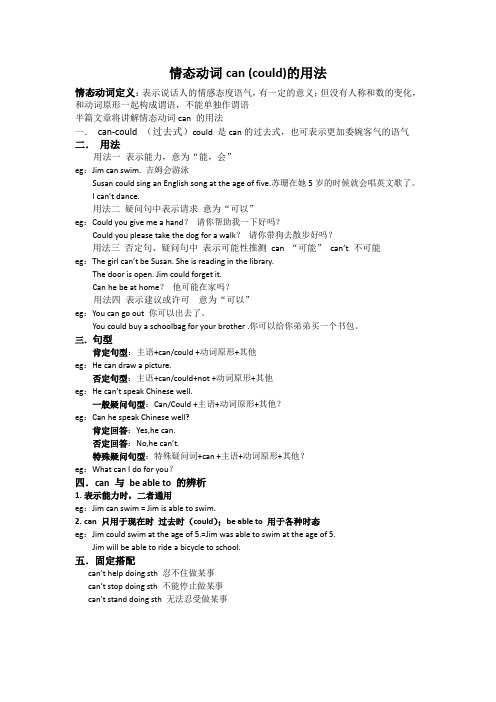
情态动词can (could)的用法情态动词定义:表示说话人的情感态度语气,有一定的意义;但没有人称和数的变化,和动词原形一起构成谓语,不能单独作谓语半篇文章将讲解情态动词can 的用法一.can-could (过去式)could 是can的过去式,也可表示更加委婉客气的语气二.用法用法一表示能力,意为“能,会”eg:Jim can swim. 吉姆会游泳Susan could sing an English song at the age of five.苏珊在她5岁的时候就会唱英文歌了。
I can’t dance.用法二疑问句中表示请求意为“可以”eg:Could you give me a hand?请你帮助我一下好吗?Could you please take the dog for a walk?请你带狗去散步好吗?用法三否定句、疑问句中表示可能性推测can “可能”can’t 不可能eg:The girl can’t be Susan. She is reading in the library.The door is open. Jim could forget it.Can he be at home?他可能在家吗?用法四表示建议或许可意为“可以”eg:You can go out 你可以出去了。
You could buy a schoolbag for your brother .你可以给你弟弟买一个书包。
三.句型肯定句型:主语+can/could +动词原形+其他eg:He can draw a picture.否定句型:主语+can/could+not +动词原形+其他eg:He can’t speak Chinese well.一般疑问句型:Can/Could +主语+动词原形+其他?eg:Can he speak Chinese well?肯定回答:Yes,he can.否定回答:No,he can’t.特殊疑问句型:特殊疑问词+can +主语+动词原形+其他?eg:What can I do for you?四.can 与be able to 的辨析1.表示能力时,二者通用eg:Jim can swim = Jim is able to swim.2.can 只用于现在时过去时(could);be able to 用于各种时态eg:Jim could swim at the age of 5.=Jim was able to swim at the age of 5.Jim will be able to ride a bicycle to school.五.固定搭配can’t help doing sth 忍不住做某事can’t stop doing sth 不能停止做某事can’t stand doing sth 无法忍受做某事六.could 表示更加委婉客气的请求1.委婉请求别人做某事(提出请求)句型:Could you (please) do sth? /Could you please not do sth?肯定回答:Yes,I can. /Sure./Certainly./Of course I can,/No problem.否定回答:Sorry,I can’t+原因/I’m afraid I can’t+原因eg:Could you please take the bag to the living room?Yes,sure.2.委婉请求别人允许自己做某事(征求许可)句型:Could I do sth?肯定回答:Yes,you can./Yes, please.否定回答:No,you can’t/I’m afraid you can’teg:Could I play with my best friend?I’m afraid you can’t.You have too much homework to do.。
情态动词can和could的用法
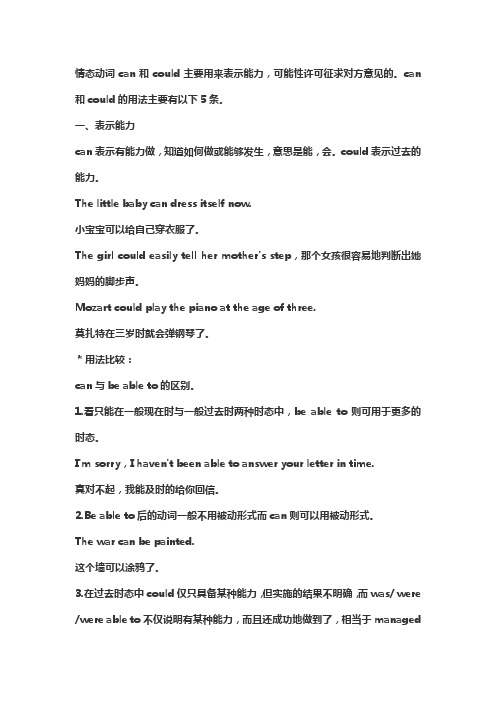
情态动词can和could主要用来表示能力,可能性许可征求对方意见的。
can 和could的用法主要有以下5条。
一、表示能力can表示有能力做,知道如何做或能够发生,意思是能,会。
could表示过去的能力。
The little baby can dress itself now.小宝宝可以给自己穿衣服了。
The girl could easily tell her mother's step,那个女孩很容易地判断出她妈妈的脚步声。
Mozart could play the piano at the age of three.莫扎特在三岁时就会弹钢琴了。
*用法比较:can与be able to的区别。
1.看只能在一般现在时与一般过去时两种时态中,be able to则可用于更多的时态。
I'm sorry,I haven't been able to answer your letter in time.真对不起,我能及时的给你回信。
2.Be able to后的动词一般不用被动形式而can则可以用被动形式。
The war can be painted.这个墙可以涂鸦了。
3.在过去时态中could仅只具备某种能力,但实施的结果不明确,而was/ were /were able to不仅说明有某种能力,而且还成功地做到了,相当于managedI talked with the boy for a long time and eventually I was able to make him believe me.我和那个男孩谈了很久,最终还是让他相信了我的话。
二、表示可能性1.用在肯定句中,表示理论上的可能性,指常有的行为或情形,意思是有时会……。
Tom can be really annoying.他们有时的确令人讨厌。
It can be very hot here in summer.这里夏天有时会很热。
人教版八年级英语下册Unit 3 情态动词can与could用法归纳

情态动词can与could用法归纳一、表示能力(1) 表示现在的能力,用can:I can’t decide which to choose. 我不能决定选哪个好。
While I sympathize, I can’t really do much to help. 尽管我很同情,我却不能真正帮多少忙。
(2) 表示将来的能力,通常不用can或could,而用be able to的将来时态:I’ll be able to speak French in another few months. 再过几个月我就会讲法语了。
One day people will be able to go to the moon on holiday. 总有一天人们可以到月球上去度假。
但是,若表示现在决定将来是否有能力做某事,则可用can:Can you come to the party tomorrow? 你明天能来参加我们的聚会吗?(3) 表示过去的能力,有时可用could,有时不能用could,具体应注意以下几点:①若表示过去一般的能力(即想做某事就随时可做某事的能力),可用could:Could you speak English then? 那时候你会说英语吗?②若表示过去的特定能力(即在过去特定场合做某事的能力),则不能用could,而用was (were) able to do sth.,或用managed to do sth.,或用succeeded in doing sth. 等。
He studied hard and was able to pass the exam. 他学习很努力,所以考试能及格。
At last he succeeded in solving the problem. 他终于把那个问题解决了。
【注】could 不用来表示过去特定能力通常只限于肯定句,否定句或疑问句中,它则可以表示过去特定的能力:I managed to find the street, but I couldn’t find her house. 我想法找到了那条街,但没找到她的房子。
(完整版)can和could用法异同

情态动词can 和could 异同对于情态动词can 和could,后者是前者的过去形式,但是却不见得总是表示过去,具体用法如下:1. 表示“能力”,相当于汉语的“能够、可以、得以”等意思,在这种情况下,can 用于现在时态,could 用于过去时态,如:1)表示现在:I can carry both suitcases.我可以搬动两个箱子。
Can you remember the war?你还能记得那场战争吗2)表示过去:We could see the oil bleeding out from the joint.(那时)我们可以看出油从接缝处渗出。
It was so dark that we could see nothing.(当时)天太暗了,我们什么也看不见。
2. could比较委婉客气地提出问题或陈述看法,这时could和can没有时间上的差别。
如:—Could you let me have your passport? —看看你的护照好吗?—Yes, here it is. —行,这就是。
I could come earlier, if necessary. 如果必要我可以早点来。
3. 表示“猜测”,相当于汉语的“有可能”,一般不分时态,具体区别如下1) 表示理论上的可能性(即从理论上分析是可能的,但实际未必会发生),可用can(表现在)或could(表过去):E.g. He is in poor health. He can be ill at any time. 他身体不好,随时都可能会生病。
Even experts can make mistakes. 即使是专家也可能会出差错。
My mother could be very unpleasant at times. 我母亲有时候会让人非常不愉快。
2) 表示现实可能性,这包含两个方面的含义:一是指将来可能性,一是指现在的可能性,在这两种用法中,通常都不用can,但可用could (可以指现在,相当于may / might):E.g. 今年夏天我们可能要去日本。
小学英语语法can 和 could 的用法
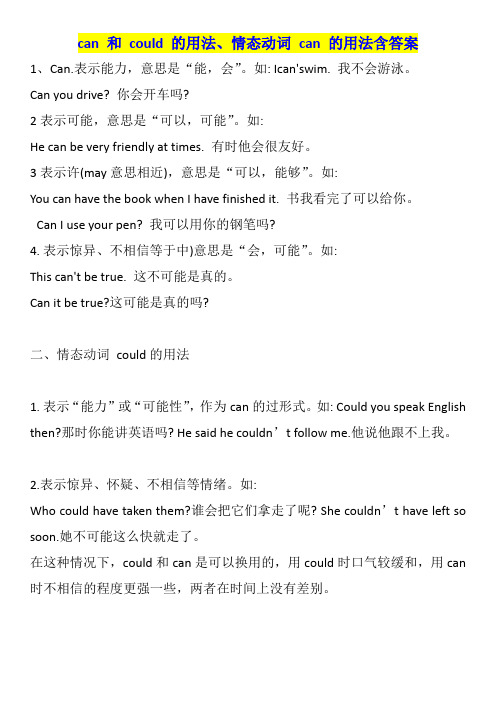
can 和could 的用法、情态动词can 的用法含答案1、Can.表示能力,意思是“能,会”。
如: Ican'swim. 我不会游泳。
Can you drive? 你会开车吗?2表示可能,意思是“可以,可能”。
如:He can be very friendly at times. 有时他会很友好。
3表示许(may意思相近),意思是“可以,能够”。
如:You can have the book when I have finished it. 书我看完了可以给你。
Can I use your pen? 我可以用你的钢笔吗?4.表示惊异、不相信等于中)意思是“会,可能”。
如:This can't be true. 这不可能是真的。
Can it be true?这可能是真的吗?二、情态动词could的用法1.表示“能力”或“可能性”,作为can的过形式。
如: Could you speak English then?那时你能讲英语吗? He said he couldn’t follow me.他说他跟不上我。
2.表示惊异、怀疑、不相信等情绪。
如:Who could have taken them?谁会把它们拿走了呢? She couldn’t have left so soon.她不可能这么快就走了。
在这种情况下,could和can是可以换用的,用could时口气较缓和,用can 时不相信的程度更强一些,两者在时间上没有差别。
3.比较委婉客气地提出问题或陈述看法。
如:-Could you let me have your passport? -可以让我看看你的护照吗?-Yes,here it is.行,这就是。
I could come earlier,ifnecessary. 如果必要我可以早点来。
这时could和can没有时间上的差别。
4.在虚拟条件句中构成谓语。
如:I would certainly do it for you ifI could.要是我能做得到,我一定会为你们做这事儿。
情态动词can和could用法详解

情态动词c a n和c o u l d用法详解 Document number【980KGB-6898YT-769T8CB-246UT-18GG08】情态动词can和could 用法详解can 和 could 用法详解1. 表示能力,could 是 can 的过去。
如:Can you speak English 你会说英语吗Could you speak English then 那时候你会说英语吗2. 表示许可,注意以下用法:(1) 对于现在或将来的“许可”,要区分以下两种情况:a. 表示请求允许(即请求别人允许自己做某事),可用 can(=may)或could(=might)(注意:这里的 could 并不表示过去,而是表示现在,只是语气较委婉)。
如:Can [May, Could, Might] I come in 我可以进来吗b. 表示给予允许(即自己允许别人做某事),一般只用 can(=may),而不能用 could 或 might。
如:A: Could [Can] I use your pen 我可以借用你的钢笔吗B: Yes, of course you can. 当然可以。
(注意: 此处不用 Yes,you could)(2) 对于过去的“许可”,也要区分以下两种情况:a. 表示过去一般性允许(即表示某人随时都可以做某事),用 can的过去式(即could)。
如:When I lived at home, I could watch TV whenever I wantedto. 我住在家里时,想什么时候看电影就可以什么时候看 (一般性允许)。
b. 表示过去特定的允许( 即表示在过去某一特定情况下允许进行某一活动),则不用 could, 而需换成其它表达(如:had permission或 was [were] allowed to)。
如:I was allowed to see the film yesterday evening. 昨天晚上允许我去看了电影(特定的允许,所以不能用 could)。
情态动词can和could之基本用法课件

注意事项二:注意情态动词的否定形式
注意点描述
情态动词的否定形式通常为在情态动词后加 not,缩写为n't。学习者需要注意否定形式 的正确运用。
示例
例如,"He can't come to the party because he has to work."(他不能来参加 聚会,因为他必须工作。)中,can't是情 态动词can的否定形式。
情态动词与其他动词结合 使用,可以构成各种时态 和语态,如现在时、过去 时、将来时、进行时、完
成时等。
替代实义动词
在某些情况下,情态动词 可以替代实义动词,表示 说话者的意愿或建议,如 “I can go with you”(
我可以和你一起去)。
常见情态动词
can
表示能力、可能性或允许,如“I can swim”(我会游泳)。
误区二:忽视情态动词与其他动词的搭配使用
误区描述
学习者在使用情态动词时,有时会忽视它们与其他动词的搭配使用,导致句子表达不清或不准确。
正确用法
情态动词后应接动词原形,表示对动作或状态的推测、判断或假设。例如,"She may go to the park tomorrow."(她明天可能会去公园。)中,may后面接的是动词原形go。
特殊疑问句
Where could she be?(她可能在哪里?)
06
常见误区与注意事项
误区一:混淆can与could的用法
误区描述
许多学习者常常混淆can与could的用法,认为二者可以随意互换。
正确用法
can表示现在或将来的能力或可能性,而could则表示过去的能力或可能性。例如,"I can swim."(我会游泳) 表示现在的能力,而"I could swim when I was a child."(我小时候会游泳)表示过去的能力。
Can和could的用法和区别
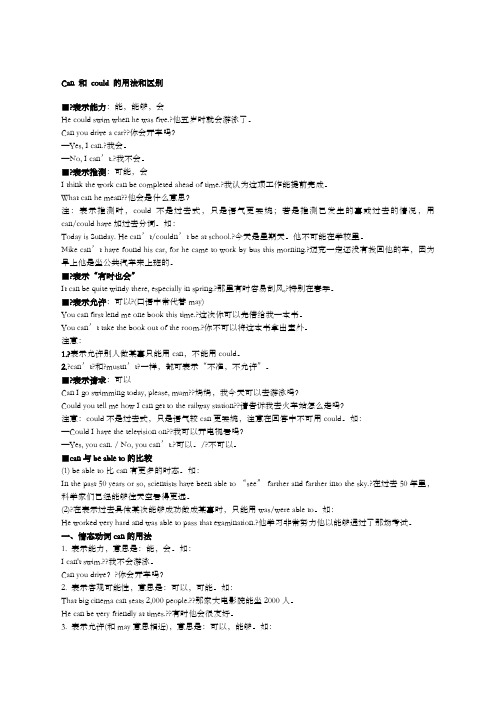
Can 和could 的用法和区别■?表示能力:能,能够,会He could swim when he was five.?他五岁时就会游泳了。
Can you drive a car??你会开车吗?—Yes, I can.?我会。
—No, I can’t.?我不会。
■?表示推测:可能,会I think the work can be completed ahead of time.?我认为这项工作能提前完成。
What can he mean??他会是什么意思?注:表示推测时,could不是过去式,只是语气更委婉;若是推测已发生的事或过去的情况,用can/could have加过去分词。
如:Today is Sunday. He can’t/couldn’t be at school.?今天是星期天。
他不可能在学校里。
Mike can’t have found his car, for he came to work by bus this morning.?迈克一定还没有找回他的车,因为早上他是坐公共汽车来上班的。
■?表示“有时也会”It can be quite windy there, especially in spring.?那里有时容易刮风,?特别在春季。
■?表示允许:可以?(口语中常代替may)You can first lend me one book this time.?这次你可以先借给我一本书。
You can’t take the book out of the room.?你不可以将这本书拿出室外。
注意:1.?表示允许别人做某事只能用can,不能用could。
2.?can’t?和?mustn’t?一样,都可表示“不准,不允许”。
■?表示请求:可以Can I go swimming today, please, mum??妈妈,我今天可以去游泳吗?Could you tell me how I can get to the railway station??请告诉我去火车站怎么走吗?注意:could不是过去式,只是语气较can更委婉,注意在回答中不可用could。
情态动词 can,could

情态动词 can/could 4个不同用法
2,语气不同,与时态无关: could语气更委婉 ➢ Can you help me? ➢ Could you help me? ➢ Can you open the door please? ➢ Could you open the door please?
B: No, I ______.
2. 按要求完成句子。 1. He can ride a bike. (改为一般疑问句和否定句,并作肯定和否定回答) 一般疑问句_________________________ 否定句____________________________ 肯定回答_______________ 否定回答__________________ 2.你会弹吉他吗? _______ you ________ _________ guitar? 3.两年前我不会骑自行。 I _______ _________ a bike two years ________ .
can/can't 与 could/couldn't
情态动词和虚拟语气
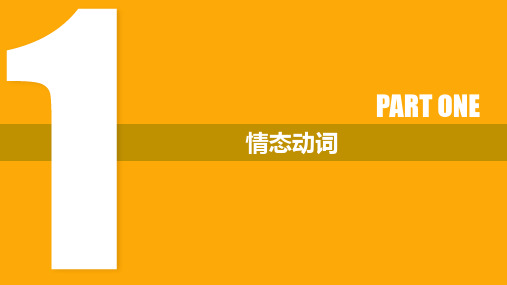
用法 1 must have done表示对过去已发生的事情进行肯定的推断,只用于肯定句中,
意为“一定,必定”,其否定形式为:can't/cannot/couldn't have done。
It must have rained last night, for the road was quite wet. 昨晚肯定下雨了,因为路面十分潮湿。 I saw Mr. Wang just now. He couldn't/can't have gone abroad. 刚刚我还看见王先生了,他不可能出国了。
Such a gentleman should do that. 这样一位绅士竟然会做那种事。
一、情态动词的基本用法 5 should/ought to的用法
(3)ought to表示义务或责任,意为“应该”,语气比should稍重。
You ought not to be late for such an important meeting. 这么重要的会议你不应该迟到。
一、情态动词的基本用法 1 can/could的用法
(4)can的几个常用句型
❷“cannot wait to do ”意思是“急于做”,表示强调的肯定意思。 I cannot wait to read the book。 我非常渴望读这本书。
一、情态动词的基本用法 1 can/could的用法
should/ ought to
should/ought to用来表示推测时意为“应该”,即含有“按道理来说应当如此” 的意思。
He can't have left. His coat is here. 他不可能已经走了。他的外套还在这里。 Mr. Bush is on time for everything. How can it be that he was late for the meeting? 布什先生做什么事情都很准时,他怎么可能开会迟到呢? Someone must have used my umbrella yesterday. I found it wet. 昨天一定有人用了我的雨伞,我发现它湿了。 She promised to come by 10 o'clock. She should/ought to be here at any moment. 她答应10点之前来的。她随时都可能来到。
could can的用法
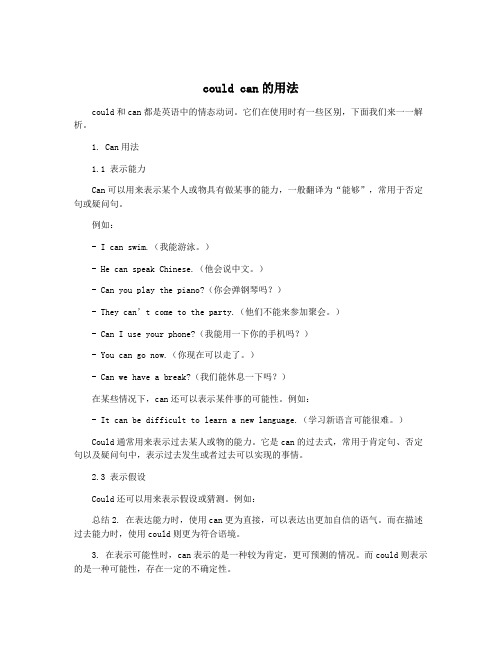
could can的用法could和can都是英语中的情态动词。
它们在使用时有一些区别,下面我们来一一解析。
1. Can用法1.1 表示能力Can可以用来表示某个人或物具有做某事的能力,一般翻译为“能够”,常用于否定句或疑问句。
例如:- I can swim.(我能游泳。
)- He can speak Chinese.(他会说中文。
)- Can you play the piano?(你会弹钢琴吗?)- They can’t come to the party.(他们不能来参加聚会。
)- Can I use your phone?(我能用一下你的手机吗?)- You can go now.(你现在可以走了。
)- Can we have a break?(我们能休息一下吗?)在某些情况下,can还可以表示某件事的可能性。
例如:- It can be difficult to learn a new language.(学习新语言可能很难。
)Could通常用来表示过去某人或物的能力。
它是can的过去式,常用于肯定句、否定句以及疑问句中,表示过去发生或者过去可以实现的事情。
2.3 表示假设Could还可以用来表示假设或猜测。
例如:总结2. 在表达能力时,使用can更为直接,可以表达出更加自信的语气。
而在描述过去能力时,使用could则更为符合语境。
3. 在表示可能性时,can表示的是一种较为肯定,更可预测的情况。
而could则表示的是一种可能性,存在一定的不确定性。
4. 在使用can和could时,注意区分它们的语境,避免语法错误和表达不当所带来的误解。
掌握can和could的使用方法,能够提高我们的英语表达水平,也能够为我们在实际交流中带来更好的效果。
我们还需要不断地扩充自己的词汇量,了解更多的语法和用法,才能够更加熟练地使用英语,表达自己的想法和意见。
除了can和could,情态动词还包括might、may、must、shall、should、will、would等等。
情态动词can与could用法归纳
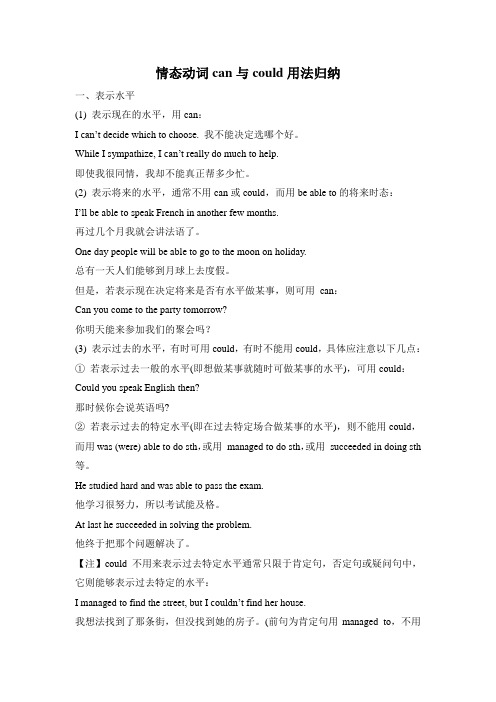
情态动词can与could用法归纳一、表示水平(1) 表示现在的水平,用can:I can’t decide which to choose. 我不能决定选哪个好。
While I sympathize, I can’t really do much to help.即使我很同情,我却不能真正帮多少忙。
(2) 表示将来的水平,通常不用can或could,而用be able to的将来时态:I’ll be able to speak French in another few months.再过几个月我就会讲法语了。
One day people will be able to go to the moon on holiday.总有一天人们能够到月球上去度假。
但是,若表示现在决定将来是否有水平做某事,则可用can:Can you come to the party tomorrow?你明天能来参加我们的聚会吗?(3) 表示过去的水平,有时可用could,有时不能用could,具体应注意以下几点:①若表示过去一般的水平(即想做某事就随时可做某事的水平),可用could:Could you speak English then?那时候你会说英语吗?②若表示过去的特定水平(即在过去特定场合做某事的水平),则不能用could,而用was (were) able to do sth,或用managed to do sth,或用succeeded in doing sth 等。
He studied hard and was able to pass the exam.他学习很努力,所以考试能及格。
At last he succeeded in solving the problem.他终于把那个问题解决了。
【注】could 不用来表示过去特定水平通常只限于肯定句,否定句或疑问句中,它则能够表示过去特定的水平:I managed to find the street, but I couldn’t find her house.我想法找到了那条街,但没找到她的房子。
情态动词can,could的用法(定稿)- 吕燕

示 例 翻译下列句子。 1. Can this be true?
这会是真的吗?
怀疑
2. He is such nice a person that he can’t commit the crime.
他是如此好的一个人,他不可能会犯罪。
不相信
Байду номын сангаас
3. How can you be so careless? 你怎么会如此粗心呢?
1.我能帮你什么吗?(许可) 2.请你把账单给我好吗?(客气的请求) 3.请你等一会儿,好吗?(请求) 当然,我们能等。(能力) 4.这会是水果的费用吗?(推测) 5.我禁不住认为你是在敲竹杠。 (禁不住做某事)
6.我不能为那付钱。(能力)
7.这件事可能吗?(疑惑,惊讶)
示 例
Liu Xiang can run the 110m hurdle race within 13 seconds.
听到这个故事,我禁不住大笑起来。
can/could用法五:用于固定习语中 can’t …too/ enough 表示“无论…也不过分,越…越好”
can’t help doing sth. 表示“禁不住做某事”
练习巩固
请选择方框中的选项并用其适当形式完成下列句子。
can, could, can have done, could have done
练习巩固
请选择方框中的选项并用其适当形式完成下列句子。
can, could, be able to, can have done, could have done
1. Everyone here _____________ speak English.
解析: 1. 这句话的意思是“这里的每个人都会说英语”,表“能力”。故答案为: can
- 1、下载文档前请自行甄别文档内容的完整性,平台不提供额外的编辑、内容补充、找答案等附加服务。
- 2、"仅部分预览"的文档,不可在线预览部分如存在完整性等问题,可反馈申请退款(可完整预览的文档不适用该条件!)。
- 3、如文档侵犯您的权益,请联系客服反馈,我们会尽快为您处理(人工客服工作时间:9:00-18:30)。
5. But she didn’t turn up .She could be with her friends right now laughing at him. 6. He could not believe his eyes. 7. He could not have Yong Hui getting away with telling people lies! 8. Perhaps with a discount and a new sign he could win his customers ay today, so I hope you can all
meet the one you love.
1. Our history test was so long last week that no one could finish it. 2. It was the last day of school ,but the teacher said that we could not leave early. 3. The hunters have been lost for days. They could starve. 4. Could you please show me the way to Beihai Park?
5. A man landed on Mars? You must be
joking. That can’t be true. 6. Magpies make a bridge of their wings so
the couple can cross the river to meet.
7. How can I grow thinner, Mum?
Practice
1. It is now a children’s festival, when they can dress up and go to their neighbors’ homes to ask for sweets. 2. Festivals can also be held to honor famous people. 3. Harvest and Thanksgiving festival can be very happy events. 4. Jim isn’t very good at maths or science, but he can speak English very well.
can的基本用法:能力、可能性、许可
can的“核心含义”是强调“潜在的可 能性”,而不是真正地去实施,那与 “能力”有什么关系呢?当句子的主 语是有生命的动作执行者时即人类或 动物,此时的“潜能”往往就会解释 为“能力。”这种能力有两种:生来具 有的能力和后天习得的能力。
A fish can’t walk, but it can swim. 鱼不会走路,但会游泳。 My son can play the piano. 我儿子会弹钢琴。 There are times when the traffic here can be very heavy. 这里的交通有时可能会很拥堵。 The theater can seat 10,000 people. 这家剧院可坐1万人。 You can use my car tomorrow. 你明天可以用我的小车。
could的基本用法:
1、表示过去一般的能力。was\were able to 表 示过去具体的能力。 I could run after a bus and catch it twenty years ago, but I can’t do that now. 20年前我可以追上汽车,但现在不行了。 I ran after the bus yesterday and was able to catch it. 昨天我追赶了一辆车,而且追上了它。
•表示请求 Can\Could I \we----? 请求对方允许做某事 Can\Could you---? 请求对方做某事 Could I have two tickets, please? 请给我两张票好吗? Can I use your pen? 我能用一下你的钢笔吗? Can you pass me the salt, mom? 妈妈,把盐递给我好吗?
许可: 1、can表示将来的许可通常与将来时间状语 连用。 (can表示能力时不需要时间状语) 2、could往往表示过去的许可 建议:could表示现在或将来时间,而不表示是 过去时间 请求: 1、Can \Could I\we---?表示请求对方允许我们 做某事 2、Can \Could you----?表示请求对方为我们做 某事 ( Could比Can 委婉、正式、有礼貌)
dare
can\could-------be able to may\might-----be allowed to must---------have(got)to shall\should\ought to-----be supposed to will\would-------be going to
小 结
情态动词can和could之基本用法 能力: 1、can在肯定句中表示现在或将来的一般能力 2、could在肯定句中表示过去的一般能力 (was\were able to 表示过去具体的能力) 3、can在否定句中往往表示“具体的可能性” 属于“推测性用法”。 4、could在否定句中表示“一般能力”或“具 体的能力”
作 业
各找10句含can和could的句子,说 出它们的具体用法。
Thanks for your attention!
The boy can be very naughty. 这孩子可能会很淘气。 The boy looks pale. He could be sick. 这孩子脸色煞白,他可能病了。
在英语里,can在肯定句中只能表示“理论上 的可能性”即“潜能”。
理论上的可能性:是用来说明因为具 备某些特点或条件,某人能够完成某 件事或某事可能存在的,而并不强调 何时或怎样实施这一种潜在的行为。
•表示许可(一般不用于表示现在的许可,而表示 过去的许可) I could read what I liked when I was a child. 我小时候喜欢看什么书,就看什么书。 •表示建议和忠告(并不表示是过去时间) You could pick up a cake ,chocolate is her favorite. 你可以买一份蛋糕嘛,巧克力口味的她最喜欢。 We could go to the cinema. 我们可以去看电影。
情态动词can和could 之基本用法
水建锋
特殊用法 ↑ 基本用法 ← 情态动词 → 推测性用法 ↓ (could \would\might\should) 用于虚拟意义的用法
can\could\may\might\will\would\ should\ought to\shall\must
need
这里的can 谈论的不是一个具体的事件。 因为它与说话时的现状无关。
而这里的could却表示的是 “实际的可能性”,因为它与 说话时的现状有关。这种“实 际的可能性”,就是我们所谓 的“推测性用法。”
正是由于在英语里存在这两种推测的差 别,英语语法就没有把can的这种“理 论上的可能性”的推测定义为“推测性 用法”,而把它定义为“基本用法”。
